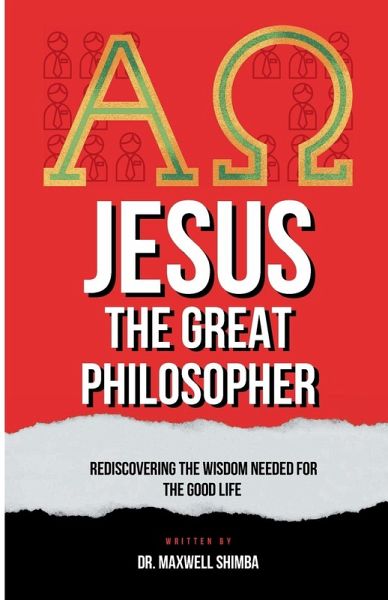
Jesus the Great Philosopher
Versandkostenfrei!
Versandfertig in über 4 Wochen
14,99 €
inkl. MwSt.

PAYBACK Punkte
7 °P sammeln!
Jesus the Great Philosopher Dr. Maxwell Shimba's work, "Jesus the Great Philosopher," presents a compelling argument that Jesus of Nazareth should be recognized not only as a religious figure but also as a profound philosopher whose teachings offer invaluable insights into ethical living and the pursuit of the good life. Shimba delves into the socio-political and religious context of first-century Palestine to illustrate how Jesus' wisdom transcends time and cultural boundaries. By situating Jesus among the great thinkers of antiquity, Shimba highlights the unique contributions of His teaching...
Jesus the Great Philosopher Dr. Maxwell Shimba's work, "Jesus the Great Philosopher," presents a compelling argument that Jesus of Nazareth should be recognized not only as a religious figure but also as a profound philosopher whose teachings offer invaluable insights into ethical living and the pursuit of the good life. Shimba delves into the socio-political and religious context of first-century Palestine to illustrate how Jesus' wisdom transcends time and cultural boundaries. By situating Jesus among the great thinkers of antiquity, Shimba highlights the unique contributions of His teachings to the fields of ethics, morality, and social justice. Central to Shimba's thesis is the idea that Jesus' ethical teachings, such as the Beatitudes and the Golden Rule, provide a robust framework for virtuous living. These teachings, which emphasize love, humility, and compassion, are not only relevant to the Christian faith but also offer universal principles that can guide moral behavior in diverse cultural contexts. Shimba argues that Jesus' emphasis on love-both for God and neighbor-serves as a foundational ethic that can transform personal relationships and societal structures alike. Shimba also explores Jesus' approach to justice and mercy, presenting it as a balanced and holistic vision that addresses the root causes of social inequalities. Unlike retributive justice systems that focus on punishment, Jesus advocates for restorative justice, which seeks to heal and reconcile. Shimba illustrates how Jesus' parables and interactions with marginalized individuals underscore the importance of forgiveness, restitution, and the restoration of relationships, offering a transformative model for contemporary justice systems. In addition to ethical teachings, Shimba emphasizes Jesus' philosophical insights into human nature and the pursuit of wisdom. By using parables, Jesus communicated complex truths in an accessible manner, prompting His listeners to reflect deeply on their own lives and values. Shimba highlights the philosophical depth of these parables, showing how they address fundamental questions about human existence, morality, and the nature of the divine. Shimba's analysis extends to the modern implications of Jesus' philosophy, advocating for its integration into contemporary education and public discourse. He argues that Jesus' teachings on love, justice, and reconciliation provide essential guidance for addressing today's ethical dilemmas and societal challenges. By promoting a philosophy rooted in compassion and integrity, Shimba believes that Jesus' wisdom can inspire a more just and harmonious world. Ultimately, "Jesus the Great Philosopher" by Dr. Maxwell Shimba invites readers to rediscover the profound philosophical dimensions of Jesus' teachings. By presenting Jesus as a philosopher whose wisdom is both timeless and universally applicable, Shimba challenges us to apply these principles in our personal lives, communities, and broader societal structures. This reimagining of Jesus' role as a philosopher offers fresh perspectives on how His teachings can guide us toward living the good life, marked by love, justice, and profound fulfillment.












